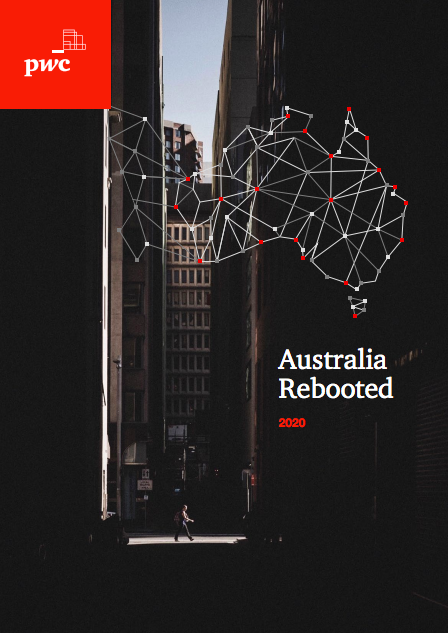PWC Australia Rebooted report: How COVID-19 is shaping the future


Price Waterhouse Cooper has released its report ‘Australia Rebooted’ which discusses resetting Australia’s economy after Covid-19. Covid-19 has had significant impacts on businesses both globally and in Australia. The future of Australia’s economy relies on how governments, businesses and individuals respond. The Australia Rebooted 2020 report warns that residing back to ‘normal’ after the ‘recovery’ would be a mistake. Australia has already changed, and further change is inevitable.
Forces of change shaping our future
The PWC ‘Australia Rebooted’ Report outlines nine key forces of change that will likely shape Australia due to the Covid-19 pandemic. These include:
- Greater government involvement – In recovery, the government will exert more influence over our lives and the economy than it has in decades; but what form will this take, investor/owner, regulator, or reformer?
- Debt and capital – Increased levels of government support lead to higher government debt and interest payments. Access to private capital may also be limited given the uncertain situation; we grow with a debt hangover.
- Consumption behaviour – The ‘new way of living’ will impact consumption behaviours with consumers becoming more cautious and digital. Consumption will reflect changed priorities and new realities. There will be a new generation of
cautious consumers emerging. - Accelerated digitalisation and data reliance – Accelerated demand for e-commerce and e-services. Businesses that have or are rapidly able to build robust digital capabilities will be in an enviable position as technology is at the forefront of change.
- Productive, flexible and distributed working – Unemployment is high, and workplace flexibility is a new norm. Increased technological competency means new high-tech skills will be required over traditional low-skill work and productivity must remain high. There’s no going back.
- Resilient secure supply chains – Significant disruption affected nearly all layers of the supply chain, highlighting vulnerabilities and revealing exposures of the current local, national, and global supply chains.
- Industry consolidation – With such large changes to business models likely, industry structure changes will follow. Some businesses will survive, some will not, and some will fundamentally change – resetting the basis for competition.
- Tax reform – The Great Lockdown has undermined the ability of governments to raise revenue given the disruption to business and personal incomes, and changed consumption and saving behaviours. With additional government expenditures to support the economy, governments will be challenged to reinvent their tax systems without stifling economic growth.
- Migration – Australia will be a more desirable destination to live and work due to our relatively successful management of Covid-19, but it is not clear to what extent we will remain open to recent migration levels. The quantum and ‘quality’ (skilled versus unskilled) of migrants will shape productivity outcomes, and affect demand for housing and infrastructure
The next actions we take have longer term impacts and how to Reboot Australia
Covid-19 is a human tragedy and it is critical we ensure there is sufficient and equitable access to medical infrastructure and services for all Australians to prevent loss of life and livelihoods. The PWC report explores at length the next actions that need to be taken long term in order to Reboot Australia and how Australia’s response so far has shaped the economy. It hopes to understand whats next for the ramifications for businesses, communities and individuals in a post-Covid-19 economy.
To access PWC’s full report, follow the prompts on this link. AMI Members can also access the full report in the AMI Content Library.






